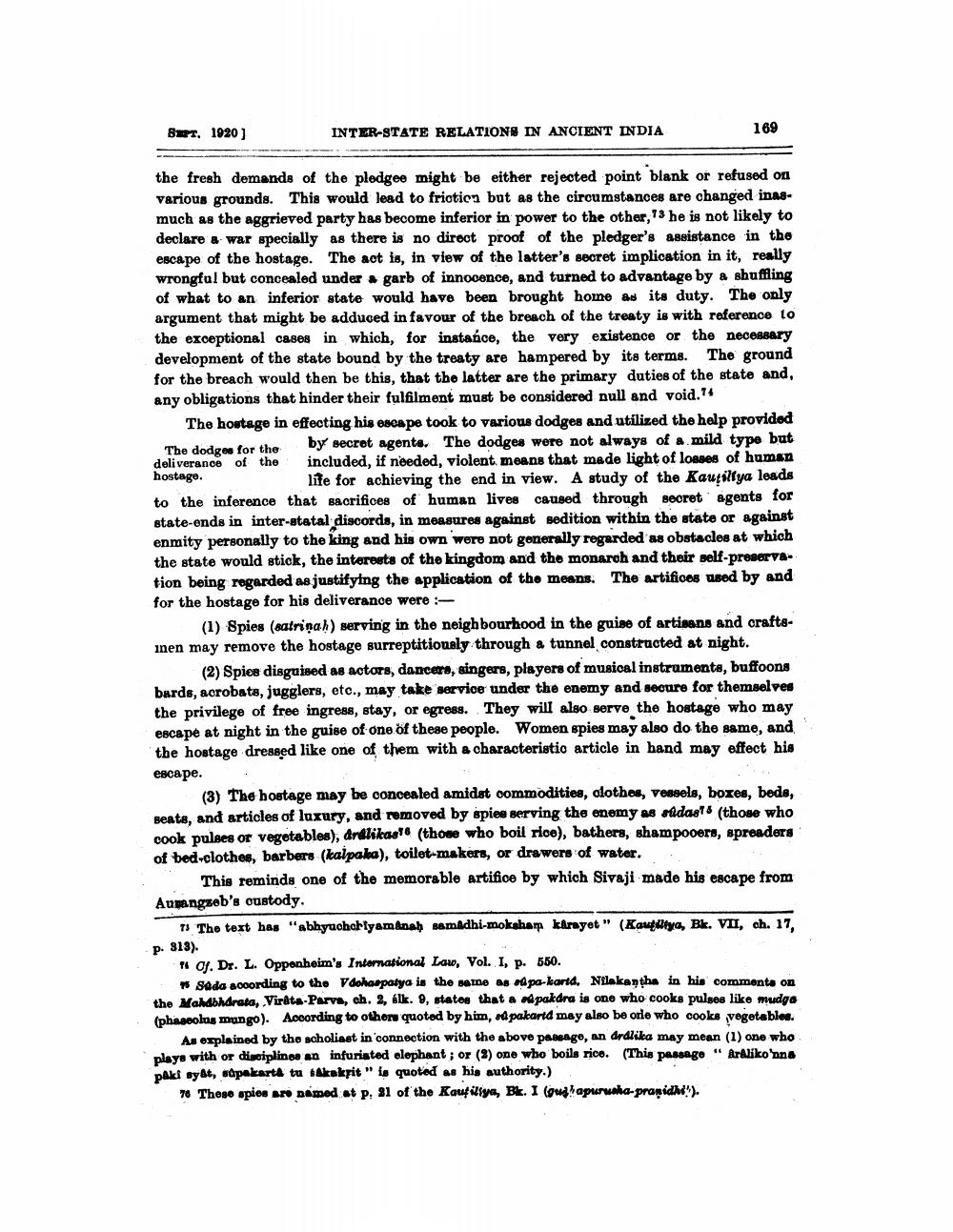________________
Swt. 1920)
INTER-STATE RELATIONS IN ANCIENT INDIA
169
the fresh demands of the pledgee might be either rejected point blank or refused on various grounds. This would lead to friction but as the circumstances are changed inasmuch as the aggrieved party has become inferior in power to the other," he is not likely to declare & war specially as there is no direct proof of the pledger's assistance in the escape of the hostage. The act is, in view of the latter's secret implication in it, really wrongful but concealed under garb of innocence, and turned to advantage by a shuffling of what to an inferior state would have been brought home as its duty. The only argument that might be adduced in favour of the breach of the treaty is with reference to the exceptional cases in which, for instance, the very existence or the necessary development of the state bound by the treaty are hampered by its terms. The ground for the breach would then be this, that the latter are the primary duties of the state and, any obligations that hinder their fulfilment must be considered null and void.74
The hostage in effecting his escape took to various dodges and utilized the help provided The doden for the by secret agente. The dodges were not always of amild type but deliverance of the included, if needed, violent means that made light of losses of human hostage.
life for achieving the end in view. A study of the Kauriltya leads to the inference that sacrifices of human lives caused through secret agents for state-ends in inter-statal discords, in measures against sedition within the state or against enmity personally to the king and his own were not gonerally regarded as obstacles at which the state would stick, the interests of the kingdom and the monarch and their self-preservation being regarded as justifying the application of the means. The artifices used by and for the hostage for his deliverance were :
(1) Spies (satrinah) serving in the neighbourhood in the guise of artisans and craftsinen may remove the hostage surreptitiously through a tunnel constructed at night.
(2) Spies disguised as actors, dancers, singers, players of musical instruments, buffoons bards, acrobats, jugglers, etc., may take service under the enemy and secure for themselves the privilege of free ingress, stay, or egress. They will also serve the hostage who may escape at night in the guise of one of these people. Women spies may also do the same, and the hostage dressed like one of them with a characteristio article in hand may effect his escape. .
(3) The hostage may be concealed amidst oommodities, clothes, vessels, boxes, bede, Beats, and articles of luxury, and removed by spies serving the enemy as ondast (those who cook pulses or vegetables), drdlikas' (those who boil rice), bathers, shampooers, spreaders of bed-clothes, barbers (kalpaka), toilet-makers, or drawers of water.
This reminds one of the memorable artifice by which Sivaji made his escape from Aurangzeb's oustody.
+ The text has "abhyachablyamanah samadhi-moksham karayet " (Kaugliya, Bk. VII, ch. 17, p. 813).
Tof. Dr. L. Oppenheim's International Law, Vol. I, p. 550.
* Sada according to the doharpatya is the same as odpa-kartd, Nilakantha in his comments on the Mahabharata, Virta-Parva, ch. 2, blk. 9, states that and pakdra is one who cooks pulses like mudga (phaseolus mungo). According to others quoted by him, ad pakartd may also be one who cooks vegetables.
As explained by the scholiast in connection with the above passage, an drdlika may mean (1) one who plays with or disciplines an infuriated elephant ; or () one who boils rice. (This passage "ArAliko'nna paki syat, sapalarta tu #Akakpit" is quoted as his authority.)
76 These spies are named at p. 81 of the Kaufiliya, Bk. I loud apurusha-pranidhi').




